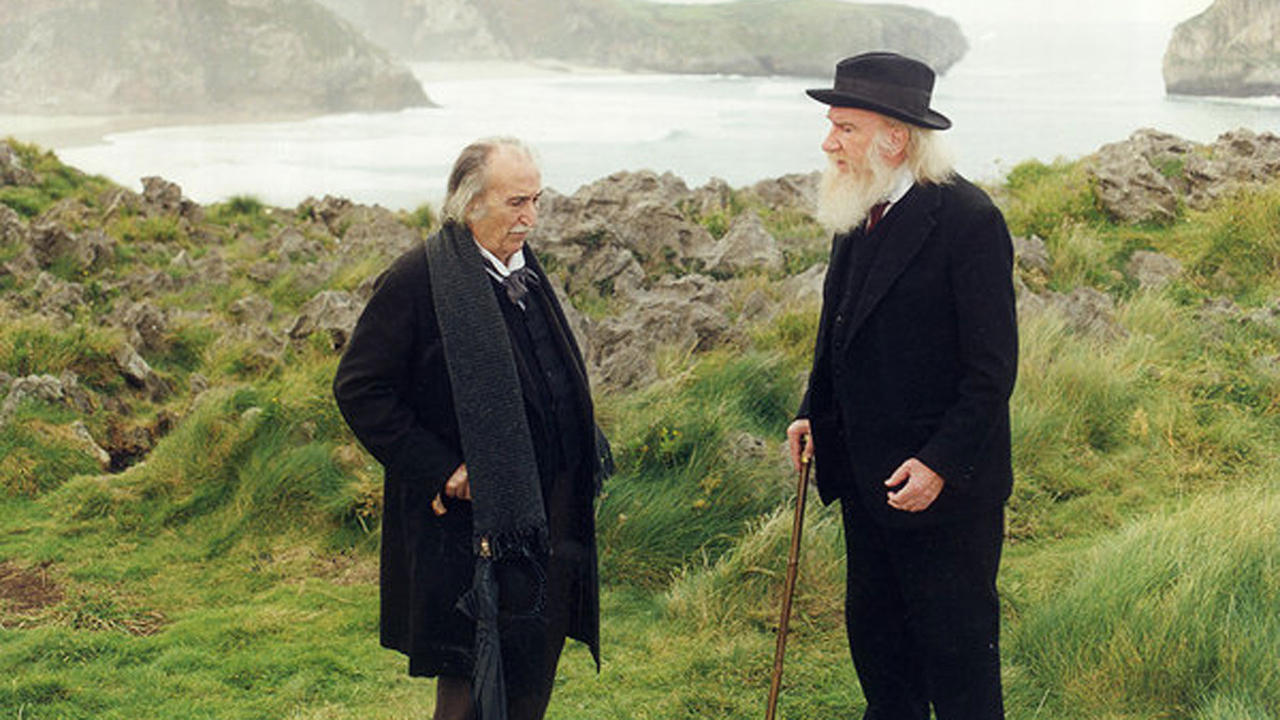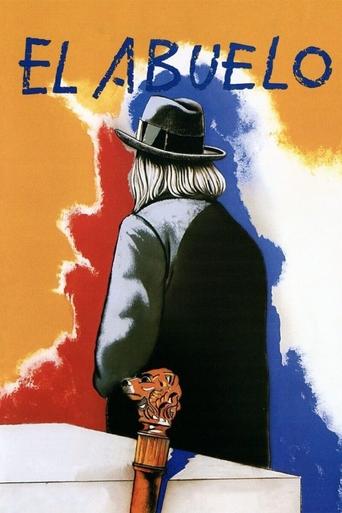

What makes it different from others?
... View MorePerfectly adorable
... View MoreWhat a freaking movie. So many twists and turns. Absolutely intense from start to finish.
... View MoreFanciful, disturbing, and wildly original, it announces the arrival of a fresh, bold voice in American cinema.
... View MoreThe Grandfather (1999) El Abuelo This film directed by José Luis Garci, who won an Academy Award in 1983 for "To Begin Again,". Based on Benito Perez Galdos novel, the film that comments on how families are built by love, not blood. Love is the only bond that can hold a family together, & this movie proves it. When an aging, bitter, turn-of-the-century Spanish aristocrat (Fernando Fernán-Gómez) learns that his son has died, he travels back to his family estate in Spain to confront his detested daughter-in-law (Cayetana Guillén Cuervo), whom he suspects of bearing him an illegitimate granddaughter. But which one is it? Which granddaughter will gain his blessing, & which his curse? This once powerful and still proud patriarch finds it hard to deal with the shameful and humiliating treatment he receives from the townsfolk. As his ego is battered, he slowly mellows. His friendship with Pio Coronado (Rafael Alonso) improves his mental health.(the old teacher who has had serious thoughts about suicide). In the last stages of his life, the Count learns a thing or two about time, love, friendship, and blood ties. He is free at last to cave in to the impulses and desires of his heart. While the film is a deeply touching story & contains very lush beautiful cinematography this movies moves at a snail's pace & is very long at 145 minutes. The great Spanish character actor Fernando Fernan-Gomez (Belle Epoque) won a Spanish Goya award for his part in this film as aged Count of Albrit. His creaky performance is a standout; excellent –well really- fantastic he is in this role characterizing The Grandfather. The film is just a little too slow & constrained. In addition to the strong performances, the film's cinematography is absolutely beautiful. The lush & verdant Spanish landscape is the backdrop, the rural scenery sweeps of Spain is just a beauty to behold. The stunning cinematography literally makes turn-of-the-century Spain appear as if it's just been stolen from an famous summer painting. In 1999, The Grandfather deserved its the Spanish nomination for an Academy Award as Best Foreign Language Film. It also received a dozen Spanish Goya nominations. This is the third time Galdos' novel has been brought to the screen, & this one is well worth the effort to watch. My main comment would be how poor the (Spanish) dubbing was. It was a very bad choice to have the two small girls voices dubbed in by fake sounding adults who do not sound like a child at all. There were consistent problems with the voice dubbing & synchronizing throughout the movie. I watched the movie in Spanish with English Subtitles. I hope this film get a wider audience than it had in 1999 it is really almost an epic of a movie and extremely beautiful and interesting. The Grandfather magically transports us to a time and a way of life that have long since disappeared. However it is a tad boring as it is long and slow but art film lovers hang in there and watch this !! I still liked the movie a lot!
... View MoreEL ABUELO (The Grandfather) began as a 1954 novel by Benito Pérez Galdós and was adapted for the screen by writer/director José Luis Garci in 1998, a year when it was nominated for Best Foreign Film Oscar. It is a period piece of epic proportions, an immensely beautiful work both visually and emotionally, that assures the film's becoming a beloved standard in the cinematic library.Don Rodrigo de Arista Potestad (Fernando Fernán Gómez, the brilliant Peruvian actor from such films as 'Butterfly', 'Belle Epoque', 'All About My Mother, etc) is a crusty old aristocrat who has been in America for the Gold Rush who returns to Spain (a small town of Jerusa) when his son dies. He concern is about a letter his son wrote to him that one of his two granddaughters was sired by another man, an artist, and the old man is determined to find out which one of the granddaughters should rightfully inherit is name and his money. He arrives to meet Dolly (Cristina Cruz) and Nelly (Cristina Cruz) and their beautiful mother Doña Lucrecia (Cayetana Guillén Cuervo), a woman who has survived emotional hardships but has generously favored the small town with gifts while giving her daughters in home schooling by the intelligent, sensitive Don Pío Coronado (Rafael Alonso) who has been forsaken by his own family. The once butler of the home Senén Corchado (Agustín González) has been freed to become an oily capitalist, eager to squander the family money.Don Rodrigo (Abuelo) challenges the family to maintain the honor of his name, becomes fast friends with Don Pío, and the two set about to discover whether it is Dolly or Nelly that is the true bloodline granddaughter. The manner in which the investigation proceeds includes the warm relationship Abuelo forms with the girls, the way he decides the future of Lucrecia, and the bonding he forms with Pío. It is Pío who challenges Abuelo with the question of which is more important, honor or love, and it is this question that suffuses the resolution of the story with surprises and with extraordinary tenderness.The actors are all superb with special kudos to Fernando Fernán Gómez and Rafael Alonso. The cinematography of the coastlines of Spain is breathtakingly beautiful and the manner in which Raúl Pérez Cubero frames his images glows. The original musical score is by Manuel Balboa whose love theme is hauntingly played by both piano and orchestra: the moments of music by Satie (Gymnopédie) and Elgar (the Nimrod variation from Enigma Variations) are beautifully performed by the Madrid Orchestra under the baton of Ángel Gil Ordóñez. The film is long (well over two hours) and there are some synchrony defects in the spoken soundtrack (?dubbing for the granddaughters' voices?), but these are minor flaws in an eloquently beautiful film. In Spanish with English subtitles. Grady Harp
... View MoreThis is a film about an elderly man's choice between love or honour. The film is long, and unnecessarily long. There was not so much in the story, and it dragged on to 2 1/2 hours. The reason why the mother became repentious of her actions was not given, therefore she became 'good' all of a sudden. How strange. The bit about suicide was hilarious, I am glad that this scene was included so that the film gets less boring. Otherwise, the film was a bore.
... View MoreMy immediate impression after seeing this film for the first time (and any really good film needs to be seen at least twice) was that at last here was another little masterpiece to add to the very limited cinematographical treasure troves produced by Spain in the last quarter of a century. 'El Abuelo' stands very well alongside `El Sur' (1982) and `Los Santos Inocentes' (1984), these two also being adapted from novels. I cannot help thinking that Garci is at his best when with the help of Valcárcel he adapts a story from real Spanish literature. As perhaps the most prestigious and prize-winning Spanish director (we shall pass over Almodóvar and his commercially orientated light entertainment), having won at Hollywood, Montreal, and Spain's own Goya prize several times, he has produced some memorable films and TV series (Historias del Otro Lado - Stories from the Other Side), mostly because he has that acute eye for capturing every detail as he shoots his scenes. He knows how to use his actors, and never better than in `El Abuelo'. The leading actors bring sincere interpretations, full of feeling, adding beauty to the situations being developed. The film is also a little tribute to Rafael Alonso, who died without seeing the finished film: his life ended with the hugely memorable part of an unpresuming private home teacher to the two little girls - Dolly and Nelly - one of whom is not really Don Rodrigo's granddaughter. Fernán Gómez is of course perfect, as he has been in most of his films in recent years, and Agustín González has at last played his best rôle in the whole of his acting career. Don Rodrigo returns from the Americas where he lost a fortune, to find out which of the two girls was due to his daughter-in-law's unfaithfulness. The novel itself is `costumbrista' as is also the novel by Concha Espina, `El Junco', which deals with a similar situation. Manuel Balboa once again has been exquisite in choosing his music and I must mention the sumptuous photography by Raúl Pérez Cubero, beautifully, lovingly captured in the countryside and around the grand old house, worth any prizes that may be floating around out there.....But I do not believe in prizes: they mostly exist only to perpetuate themselves. `El Abuelo' does not need any prizes - it stands up on its own merits: simply a wonderful film telling a story with simplicity and feeling.
... View More